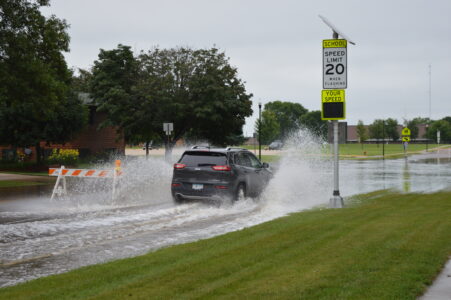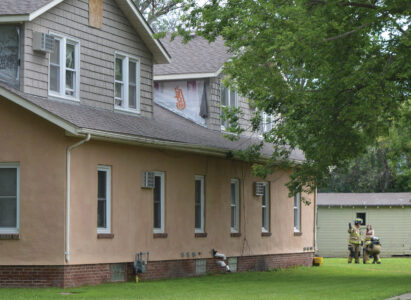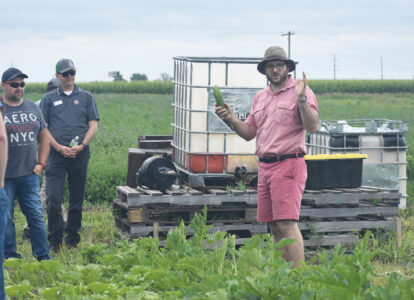Sharing their stories
Lyon County commissioners let refugees, supporters speak; some share concerns

Photo by Mike Lamb A packed crowd of area residents attended a public hearing at the Lyon County Law Enforcement Center on Tuesday night. County commissioners heard questions and comments on refugee resettlement in Lyon County — although they said the county will not be voting on the matter.
MARSHALL — Area residents had a second chance to speak out about refugee resettlement in Lyon County on Tuesday night. A public hearing drew an even bigger crowd this time around, with over 200 people filling up seats and standing along the walls of a basement classroom at the Lyon County Law Enforcement Center.
But unlike the comments at a Lyon County Board meeting earlier this month, the majority of the people speaking up Tuesday were in support of refugees.
“A refugee is someone like you,” one audience member said. “We’re not different.”
“Really, it comes down to what’s good for Marshall,” said audience member Tom Larson. He said refugees were working, paying taxes and raising families. “If you do decide to vote on this, it should be a pretty easy vote.”
Many speakers at the hearing said they were in favor of United Community Action Partnership continuing its efforts to reunite refugees with family members living in Lyon County.
County commissioners called for the hearing earlier this month when they were considering a request by UCAP for consent for refugee resettlement. At that time, an executive order from President Donald Trump had said states and counties would need to give written consent for refugees to be resettled within their jurisdictions. But since then, a preliminary injunction from a federal judge has halted enforcement of the order.
“There will be no vote at this time,” because one isn’t needed, Lyon County Board Chairman Gary Crowley told the crowd. “The purpose of this hearing is to hear comments and questions on refugee resettlement.”
After a presentation by UCAP, Crowley said members of the public could speak, but each person was limited to two minutes of speaking time.
“There’s been a lot of confusion and misunderstanding about the people who are served by this program,” said UCAP Family Services Director Angela Larson. Refugees are not the same as people seeking asylum at the U.S. border, nor are they undocumented or people who just decided to move to the U.S., she said. Refugees generally come to the U.S. from refugee camps, after fleeing war, persecution or natural disasters. It can take 10 years or more for people to go from living in a refugee camp to being resettled in another country, Larson said.
A total of 37 people have been resettled in Lyon County over the past three years, said UCAP case worker Samira Sheikh. Within the first 90 days of being resettled, UCAP works with refugees to help them get jobs and housing, enroll in school, and more. The refugee program receives federal, not local funding, Larson said.
Several speakers at the hearing were employees of Marshall Public Schools. MPS Business Services Director Dion Caron said the school district’s responsibility was to educate any and all of its students. Caron and MPS teachers said they wanted to correct false statements made at the Jan. 7 commissioner meeting, about students who were refugees or English language learners having a bad effect on the school district.
“They are smart. Their families are passionate about education,” said Marshall Middle School teacher Kari Ehlers.
Refugees and their families also spoke out about their experiences. Some said they were uncomfortable or afraid to see the negative comments about refugee resettlement going around on social media.
“It was very hard to read the comments,” said Southwest Minnesota State University student Fadumo Ismail. Ismail’s parents came to the U.S. as refugees of the civil war in Somalia. Ismail said the negative comments made her feel like she might not want to come back to Marshall, but she was determined to stay and become a physician’s assistant.
Peter Thor, assistant principal at Marshall Middle School, talked about how his parents came to the U.S. from Laos. Now, Thor said, he is “A proud, proud, proud resident of Marshall.”
Thor, along with several refugee speakers, thanked Marshall residents for their support.
Not all comments at the hearing were positive.
“I do have some deep concerns,” said Redwood County resident Tiffany Knott. Resettlement may not be funded locally, she said, but “It’s all taxpayer money.”
“What is the cost to the county?” Knott asked.
“I’m not going to say I’m against or for” refugee resettlement, said audience member Roger Baumann. However, he said, “I don’t believe the government should be sponsoring it.” Refugee resettlement wasn’t in the U.S. Constitution, he said. “There’s no authorization in there for benevolence.”
Rural Marshall resident Glen Deutz asked how area residents can help refugees in their communities.
“Coming here today and showing people the community supports them is invaluable,” Angela Larson said. She also said UCAP has lots of volunteer opportunities for people who want to help.



